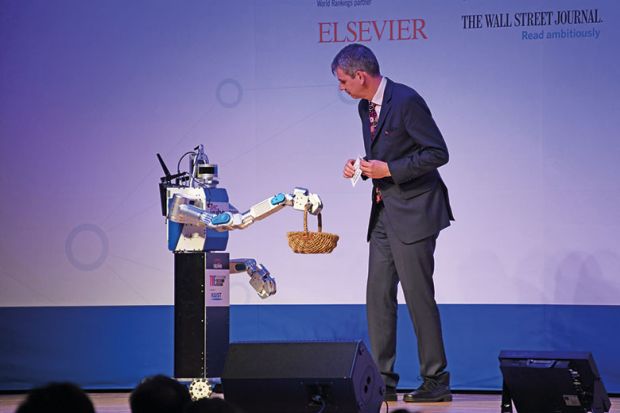Nations should consider rebalancing their education systems, and potentially reducing university enrolment levels, to tackle youth unemployment rates that are a “tragedy” in many countries, a conference heard.
Lino Guzzella, former president of ETH Zurich, told the Times Higher Education Innovation and Impact Summit that the diverging opportunities for those with and without the highest-level skills meant that “you are now either a genius or you are flipping burgers”.
Speaking at the Korea Advanced Institute of Science and Technology (KAIST), Professor Guzzella quoted a paper by the US economist Raj Chetty, published in Science, which showed that the likelihood of each generation having a higher income at the age of 30 than their parents had diminished dramatically.
“It used to be very easy to make the promise to your kids that they would be better off than us, but this has completely changed. In 2010, the probability was below 30 per cent,” Professor Guzzella said.
This was partly because of a worrying decline in middle-income professions, he suggested. Between 2000 and 2010, the number of very high-skilled jobs and very low-skilled jobs doubled, whereas the number of those in the middle increased far more slowly.
Professor Guzzella predicted that this would continue: “In the same way that manual labour was taken over by machines in the last century, so cognitive labour that can be automated will be.”
He suggested that knowledge could be classified into three distinct grades: “declarative knowledge”, “procedural knowledge” and “creative knowledge”.
The first has already become a “commodity”, Professor Guzzella suggested, adding that “no one will make their living because they know something any more”.
The second would remain important for lower-skill jobs, but “if you really want to be successful, you have to be very strong in creative knowledge: you have to be able to see where weaknesses are and come up with new ideas”.
Professor Guzzella said that universities seeking to restructure their approach for this changed world should focus on inculcating critical thinking, interdisciplinarity and “productive failure”.
“Failure is underestimated,” he said. “Productive failure produces better innovators, but it can’t just be letting your students fail and then go home feeling depressed; you must let them fail in a controlled way and then help them understand why something failed and how to do it better.”
Professor Guzzella also said that there had been a “huge inflation” in university enrolments around the world, coupled with a “substantial mismatch between what universities teach and what society needs”.
“What should a young person think if they finish their education and are then told by society, ‘Sorry, we do not need you.’ That is very hard for them, and we need to do better,” he said.
In Switzerland, where he noted that youth unemployment rates were far lower than many other countries, the education system was designed so that “only 20 per cent of an age cohort goes through classical university education, and 80 per cent do vocational training organised by companies. They learn what is really needed [by industry and society], so there is not the mismatch that exists elsewhere,” he said.
Asked whether his conclusion was that there were too many universities, Professor Guzzella said: “Maybe there are too many who aspire to become the top-level research universities.
“But there’s huge demand for another type of higher education…So yes, maybe we should look beyond the classical university model and find a way to train the new generation in a way that ensures society has a role for them.”
POSTSCRIPT:
Print headline: Unemployment calls for rethink of HE model
Register to continue
Why register?
- Registration is free and only takes a moment
- Once registered, you can read 3 articles a month
- Sign up for our newsletter
Subscribe
Or subscribe for unlimited access to:
- Unlimited access to news, views, insights & reviews
- Digital editions
- Digital access to THE’s university and college rankings analysis
Already registered or a current subscriber? Login








